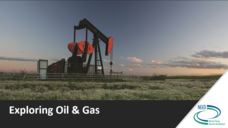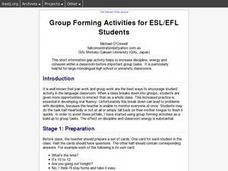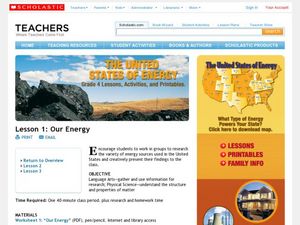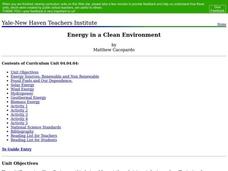Serendip
Photosynthesis and Cellular Respiration
How does energy from the sun make plants grow? Scholars move step by step through the processes that promote plant propagation during a detailed lesson. The resource illustrates ADP production and hydrolysis, then allows learners to...
National Energy Education Development Project
Exploring Oil and Gas
The United States consumes more oil than any other country, about 1.85 billion barrels (or 77 billion gallons) a day. Viewers learn about the history of fossil fuel exploration and how they are formed in an informative presentation. They...
Chicago Botanic Garden
Understanding the Greenhouse Effect
The greenhouse effect is important, for without it, life on Earth would not exist. An activity that includes modeling the greenhouse effect and acting out the Earth's energy balance makes up the first part in a series of seven lessons....
Curated OER
Earthquakes: First Grade Lesson Plans and Activities
First graders explore how earthquakes release energy in a set of hands-on activities. During the pre-lab, they discover how energy from an earthquake releases waves through the earth using a water-filled cup and pebbles. Youngsters...
Practical Action
Moja Island
Did you know that 1.3 billion people live without any form of electricity? Discover an array of possible renewable energy options by taking a trip to Moja Island, an online learning resource that will equip you and your learners with an...
CK-12 Foundation
Ski Jump
What are the three types of energy a ski jumper uses? If you said potential, kinetic, and heat, then you are correct. Scholars adjust the jumper's mass, jumper's form, and height of the start line in the simulation to display graphs of...
NOAA
Animals of the Fire Ice
When the sun's rays can't reach the producers in a food web, where does all the energy come from? Extreme environments call for extreme food sources. Young scientists investigate creatures that appear to get their energy from methane...
Curated OER
Group Forming Activities for ESL/EFL Students
Students increase discipline, energy and cohesion within a classroom to take on important group tasks. Students examine ways of how to pick partners within the boundaries of a classroom. Students validate certain ways to choose thru...
Curated OER
Energy
In this energy worksheet, students complete a crossword puzzle by determining the terms associated with the 20 given clues. Students review alternative forms of energy in this worksheet.
Curated OER
Energy and the Environment
Fifth graders define alternative energy form, design models which show how the energy source can be used, and explain the purpose of dams.
Pennsylvania Department of Education
Energy in Motion
Fifth graders explore energy transfer. In this thermal energy lesson, 5th graders stretch rubber bands several times and estimate the band's temperature change. Students identify this action as an example of thermal energy. Students...
Curated OER
Let's Learn About Energy Sources
Second graders identify at least four energy sources through sensory experiences.
Curated OER
Renewable Energy
Students examine the United States' current and future energy needs. They describe different forms of renewable energy sources and compare the impacts of renewable and non-renewable energy sources on the earth and society.
Curated OER
Potential and Kinetic Energy
Fifth graders explore how energy changes from one form to another within their surroundings. They explore how kinetic and potential energy relate to each other and the ability to do work. Students observe example of both kinetic and...
Curated OER
Energy
Young scholars distinguish between kinetic an potential energy. They recognize that energy is conserved when changing from one form to another. Students compare the scientific meaning of work with its everyday meaning.
Curated OER
Our Energy
Fifth graders research energy sources used in the United States. In this energy sources lesson, 5th graders work in teams to research various energy sources. Students complete a worksheet for the research and make a short video of a...
Pennsylvania Department of Education
Pennsylvania’s Energy Supply
Third graders become familiar with the various types of energy and which types are found in Pennsylvania. In this Pennsylvanian energy resources lesson, 3rd graders, identify wind and water as sources of energy. Students complete an...
Curated OER
Energy Costs of Walking and Running
In this energy worksheet, students use a data chart comparing the energy used while running and walking to create a graph and complete 2 short answer questions.
Curated OER
Energy Audit Form
In this energy worksheet, students calculate the energy costs of using certain household appliances. Students complete 3 graphic organizers.
Curated OER
Oil and Gas As A Source of Energy
Students discuss the reasons why oil and gas are the United States' main source of energy. In groups, they use the internet to research how the resources are formed and the amount of consumption by the United States. They choose books...
Curated OER
Work and Energy
In this work and energy worksheet, students review energy laws, potential energy, and kinetic energy. This worksheet has 8 fill in the blank, 7 short answer, and 5 matching questions.
Curated OER
Transforming Food Energy: A Balancing Act
Students explain their role as consumers. They use a purchased calorimeter or make their own simple calorimeter to measure the energy content in selected foods. This interesting lesson really gets students thinking about what they eat.
Alabama Learning Exchange
Energy
Pupils, using the Internet to research the different types of energy that people use, prepare a slideshow presentation with their research.
Curated OER
Energy in a Clean Environment
Students examine the efficiency of each alternative energy source as well as what limitations exist in terms of extracting the usable energy. They determine which energy source is most effective to the economy and the environment in the...

























